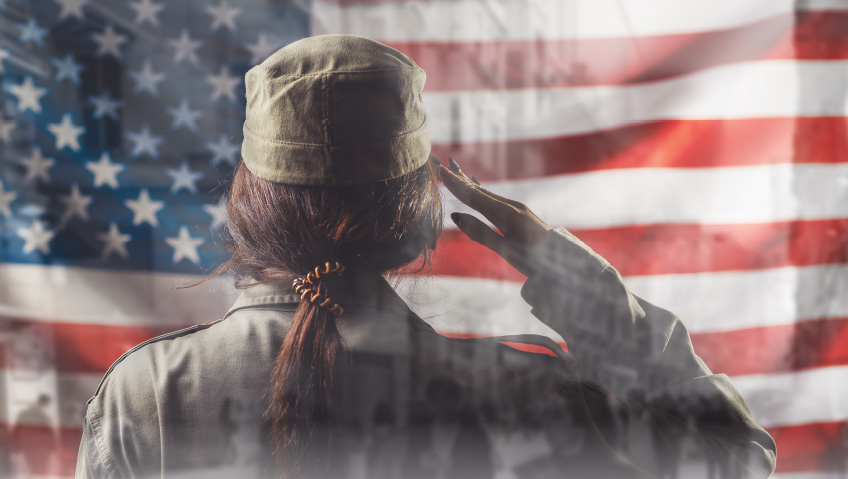The United States is home to more than 2 million women veterans—and this number is on the rise. In 2000, women veterans made up just four percent of the veteran population, but that figure is predicted to make a dramatic leap to 18 percent by 2040, according to the U.S. Department of Veterans Affairs.
An increasing number of these women veterans are making their mark on the business landscape, channeling their military experience to excel and make the most of entrepreneurial opportunities.
In fact, women veteran entrepreneurs are the fastest growing group of entrepreneurs in the United States, the military platform Sandboxx reports. The number of women veteran-owned businesses increased by a whopping 295 percent between 2007 and 2016. And, even though only one in ten veterans are women, they own one out of every six veteran-owned enterprises.
The dramatic increase in women veteran entrepreneurship is part of a larger overall trend. The number of women-owned businesses as a whole skyrocketed by 45 percent from 2007 to 2016—that’s five times faster than the national average, Sandboxx reports. As entrepreneurship among women veterans gains traction, and women’s presence in the military continues to grow, it only stands to reason that women veterans’ entrepreneurial influence in the private sector will keep strengthening as women veterans seek new opportunities after military service.
Ironically, this trend appears within an overall drop in veteran-owned businesses. Entrepreneurship ran high within the veteran population in the past, but has seen a stark decline in recent decades. Nearly half of World War II veterans and 40 percent of Korean War veterans eventually become self-employed, according to the Institute for Veterans and Military Families (IVMF) at Syracuse University and reported by Military.com. In comparison, just 4.5 percent of the post-9/11 generation of veterans are self-employed.
Also noteworthy is that, despite their expanding entrepreneurial presence, women veterans often face particular challenges that could negatively impact their transition to civilian life and business success. Wounded Warrior Project® (WWP) research has found that women who serve in the military experience anxiety and depression at higher rates than their male counterparts. Women also experience higher rates of military sexual trauma than men and 73 percent of women veterans surveyed by WWP reported that they experienced sexual assault or harassment while in service. According to the National Institutes of Health (NIH), Women veterans report “significantly higher” rates of suicidal ideation and attempted suicide than their male counterparts.
And yet, women veterans are overcoming to succeed in entrepreneurial ventures at an impressive rate. While military service can bring challenges, it can also lay a strong foundation for business success in the private sector. Veterans benefit from a range of diverse experiences that expose them to new ideas and cultivate new skillsets. They learn to excel in high-pressure situations—including when lives are on the line—while staying cool and collected. They cultivate a can-do attitude and learn how to triage when pressed with multiple demands. They learn organizational skills and how to thrive within a large, complex institution. All of these benefits can be applied to private business, particularly during challenging times; according to the U.S. Department of Labor (DOL), 59 percent of women veteran entrepreneurs believe military experience prepared them for business challenges related to the COVID pandemic.
Entrepreneurship among women veterans is often driven by a desire to better the world around them. 48 percent of women veteran entrepreneurs surveyed by the DOL’s 2020 National Survey of Military-Affiliated Entrepreneurs said that they launched a business because they “wanted to help society and support their communities.”
Of course, access to capital can be a major barrier to entry for women—veterans or civilians—who are eager to put a business idea into action. “Women-owned firms often experience challenges with access to capital,” including everything from credit cards to traditional loans and venture capital, according to a 2017 report by the National Women’s Business Council. “Research has demonstrated that compared to men, women-owned firms start their business with nearly half as much capital as men. What’s more, compared to their male counterparts, women are less likely to utilize business loans from banks or financial institutions.” 48 percent of women veteran entrepreneurs have been rejected by a lender or creditor when applying for financing, according to the DOL.
An increasing number of government and non-governmental organizations have taken note of the disparity and are rallying to support women veterans. For instance, the newly launched Women Veteran-Owned Small Business Initiative (WVOSBI) is the first program of its kind within the federal government. “WVOSBI’s mission is to equip, empower and educate Women Veteran entrepreneurs for success and economic opportunities,” the U.S. Department of Veterans Affairs reports.
Successful women veteran-owned businesses are as diverse as the women who launch them, specializing in everything from fashion to defense. Take Emily and Betsy Núñez, for instance. The two sisters founded Sword & Plough, an innovative company that uses military surplus material to create durable, stylish bags. After growing up in a military family at West Point, they launched the business while Emily was still an ROTC cadet in her senior year of college, the company website details. Sword & Plough has helped support 75 veteran jobs, repurposed over 30,000 pounds of military surplus material, and donated more than $130,000 to veteran organizations.
U.S. Army veteran Tabatha Turman founded the award-winning government consulting firm Integrated Finance and Accounting Solutions LLC (IFAS). She is a veteran of both Operation Desert Shield/Storm and Operation Iraqi Freedom, serving in Saudi Arabia in 1991 and in Iraq in 2004 and 2005, according to the company’s website. Drawing on 20 years of military experience as an Army Finance Officer and consultant specializing in military accounting and financial management, Turman has taken IFAS from a humble startup to a widely respected multi-million dollar firm with major government contracts. Clients include the U.S. Department of State, U.S. Air Force, U.S. Army, U.S. Department of Homeland Security, U.S. Navy, U.S. Department of Justice, U.S. Department of Transportation, USAID, and many more.
After serving in the U.S. Army, service-disabled veteran Phyllis Newhouse founded Xtreme Solutions, Inc. (XSI) in 2002. The company provides a diverse array of IT expertise and industry-leading information technology and cybersecurity solutions and services, Phyllisnewhouse.com details. Forty percent of the company’s employees are veterans. XSI was included in the Inc. 5000 list in 2013 and 2014 and has been named one of Women’s Presidents’ Organization’s (WPO) 50 Fastest Growing Women-Owned Companies in the U.S. seven years in a row.
Newhouse’s success has been recognized numerous times: she is the first woman to win an Ernst & Young (EY) Entrepreneur Of The Year® award in the technology category, was inducted into the Enterprising Women Hall of fame, earned a spot on Inc.’s Mighty 25 in 2020 and was a 2019 Culture Creator Honoree for the finance category, which recognizes minorities in business, her website reports. She has been featured on Today, Entrepreneur, Inc., CNBC, Forbes, Yahoo Finance, Cheddar News, and Bloomberg.
A serial entrepreneur, in 2019 Newhouse founded ShoulderUp alongside Academy Award-winning actress Viola Davis to give back to the community. The nonprofit “is dedicated to connecting and supporting women on their entrepreneurial journeys,” Phyllisnewhouse.com reports.
With support from experienced industry insiders like Phyllis Newhouse, even more women veterans will have the opportunity to make the most of their skills and abilities by launching their own enterprises. As women continue to retire from the military in increasing numbers, this determined, talented group is certainly one to watch as they redefine our expectations surrounding entrepreneurship.






